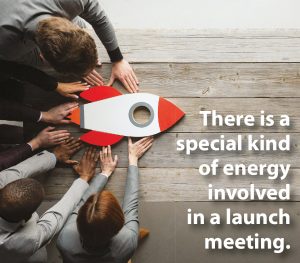
LAUNCH TRAINING – By George Witter and Michael Wallace
How do you ensure that training delivers on its objective?
 You have been given responsibility to build out your first complete training curriculum from prelaunch training to delivering the live launch meeting. After creating pre-launch foundational training, which we addressed in an article in the November 2023 issue of LTEN Focus on Training magazine, it’s time to plan for the live launch event.
You have been given responsibility to build out your first complete training curriculum from prelaunch training to delivering the live launch meeting. After creating pre-launch foundational training, which we addressed in an article in the November 2023 issue of LTEN Focus on Training magazine, it’s time to plan for the live launch event.
There is a special kind of energy involved in a launch meeting. This is the show, and everyone wants it to be memorable and successful.
With the spotlight on the meeting, how do you ensure the training delivers on its objective of readying the sales force to begin interacting with customers and effectively representing your product? How do you measure your training’s effectiveness? This article will focus on what goes into planning for an effective launch meeting and how you can demonstrate the success of your approach to internal stakeholders.
Starting Off Right
Presumably, given your efforts to provide foundational training before launch, your attendees will come to the meeting with a clear understanding of the disease state, your product, the market and the patient journey under their belt. This affords you the opportunity to create launch workshops and activities that enable your team to verbalize messaging, understand how to deal with objections, demonstrate the launch skills needed for each team member to be successful and become certified to sell your product.
As this is your first launch training you will lead, you will want to begin planning for the launch meeting by prioritizing what trainees need to accomplish to exceed your expectations and management’s. Meeting with your cross-functional stakeholders, chiefly marketing, sales leadership and medical, will enable you to understand what each expects launch training to deliver. Once you have this information you can begin designing your workshops to achieve those goals.
Any foundational training the sales team completes before attending the launch meeting should provide the requisite knowledge, understanding and confidence to sell into your market. If you build your foundation this way, the launch meeting enables the sales team to practice honing key skills like demonstrating competency in understanding and delivering key messaging, confidence in handling objections and the ability to think critically.
To set your team up for success, it’s important to build out important core workshops. These core workshops will enable your sales team to apply critically important knowledge through practice to demonstrate competency.
Core workshops for your launch should include:
- Patient Journey
How does the disease state affect the patient’s life and what pathway does a patient take to be sitting in front of a provider for evaluation and treatment? The application of this workshop is usually having trainees discuss and explain the various stages of a patient journey and critically think their way through situations and decisions a provider would make with a patient. - PI Review
What are the critical components of the package insert, or PI, for trainees to communicate to providers? Workshopping how to position the PI is critical to making sure providers understand how to appropriately use your drug. It is imperative that trainees can navigate and quickly locate key information while presenting and answering questions from providers. - Product Messaging
Your marketing department will want this workshop to be very precise as they have worked extensively to determine the most effective messages for the launch product. Include your marketing colleagues in this workshop to position approved messaging and build the proficiency of trainees’ use of the marketing resources and message integration into provider discussions. - Objection Handling
Inevitably there is resistance when trying to change the prescribing behaviors of a physician. Trainees need to be prepared to address and overcome that resistance.
Some objections to using a new product are simply a request for more understanding and information. Other objections are based on pushing through the inertia of changing someone’s behavior. In both cases the workshop should be focused on equipping the trainees with questioning and clarifying skills to get to the root of the objection and the specific approved answer to address the objection. Practice through role playing is critical if this workshop is to be successful. - Account Planning
It’s a given that there will be a 30- to 60-day plan that the trainees will execute immediately after the launch. Depending on the launch, there may be an emphasis on accounts, providers or a combination of both. The objective of an account planning workshop is to provide practice on how to incorporate tactics and approved assets that trainees will use to achieve the first 30- to 60- day objectives. - Certification
The capstone of the launch meeting should be a learning experience that certifies that representatives are competent and confident to actively sell the drug on day one after the launch meeting ends.
Certification should never be perceived as a check-the-box activity. Rather, it’s the time to demonstrate one’s command of the content shared throughout training and how to effectively position the drug with customers. Allow enough time to role-play a full call and provide specific coaching to the trainee.
As certification occurs at the end of the week, there is pressure to accelerate the certification process to get people out earlier. Streamline the process by having enough certifiers and make the rubrics for evaluations simple, effective and digital. There are many third-party applications that facilitate the collection of certification data so you as the trainer are not spending your time doing data entry after the launch meeting.
Maximizing Workshops
To get the most out of workshop time, you need to make workshop activities relevant, applicable and flexible. Start by aligning activities with adult learning principles. Gamification, if done right, is a critical element to include in select workshops if the activity is applicable to the learners.
Choose your formats strategically and change the energy from one workshop to another. If one workshop is focused on an intense case study discussion in a small group, make the next workshop about movement and working in pairs. If you have a workshop that requires people to think quietly while they prepare, have the next workshop involve some large group activities with some competition.
Mix It Up
As you think about meeting formats, make sure to think about activities that will keep your sales team engaged and challenged while simultaneously giving your sales team activities that will improve retention. Examples of this include:
- Delivering content in short bursts.
- Adding movement to workshops to avoid monotony and fatigue.
- Including opportunities for self-reflection so learners can gauge how best to use the material they are learning.
- Case scenarios/simulations that help learners think strategically and apply what they have learned during pre-launch training.
Where possible, try to take advantage of small group dynamics, mentoring and even competitive elements that can add excitement and fun into your activities. Finally, tap your internal stakeholders to help with presentations, facilitation and act as subject matter experts to take advantage of their expertise and roles within the company.
Measuring Your Results
Measuring the effectiveness of your training plan is neither a one-time activity nor done exclusively post-launch. We feel that measuring the effectiveness of your training design and delivery should be done throughout the process, enabling trainers to gather input and outcomes that not only speak to effective training but also help inform the training curricula over time.
A well thought out measurement strategy not only includes multiple touch points at specific times and on specific components to demonstrate training effectiveness, but also provides opportunities to adjust training based on feedback received from your trainees and stakeholders.
Getting Stakeholder Buy-In
Often, measuring training outcomes is an afterthought or is skipped because of the added cost and work involved in conducting assessments in a standardized way, collating the data/results and presenting the results to leadership. Because you will need adherence to a standardized data collection process, getting leadership buy-in, cooperation and support is critical to any successful outcomes strategy.
By engaging leadership and key stakeholders at the beginning of your planning process and prior to curricula development, you will gain their buy-in if your projected outcomes are aligned with your key stakeholders’ priorities and objectives. Leadership’s buy-in and support for your outcomes strategy will make or break your ability to gather measurable outcomes as they control whether to allow their field managers to be actively involved in assessments and collecting data in a unified way.
Understanding What Good Looks Like
How can you measure the effectiveness of your training curricula if you don’t define what good looks like and gain agreement of such from the key stakeholders you are working with? Map out success criteria, criteria, the point at which you expect to see tangible results and make sure your stakeholders concur with your characterization and the criteria you use to demonstrate what good should look like.
Conclusion
We hope this article helps in planning and delivering your first launch and putting in place an outcomes strategy that will enable you to demonstrate launch readiness.
 George Witter is vice president of Educational Resource Systems (ERS). Email George at gwitter@educationalresource.com or connect with him on LinkedIn at linkedin.com/in/georgewitter.
George Witter is vice president of Educational Resource Systems (ERS). Email George at gwitter@educationalresource.com or connect with him on LinkedIn at linkedin.com/in/georgewitter.
 Michael Wallace is a learning consultant with ERS. Email Michael at mwallace@educationalresource.com or connect with him on LinkedIn at linkedin.com/in/fascinnovater.
Michael Wallace is a learning consultant with ERS. Email Michael at mwallace@educationalresource.com or connect with him on LinkedIn at linkedin.com/in/fascinnovater.








